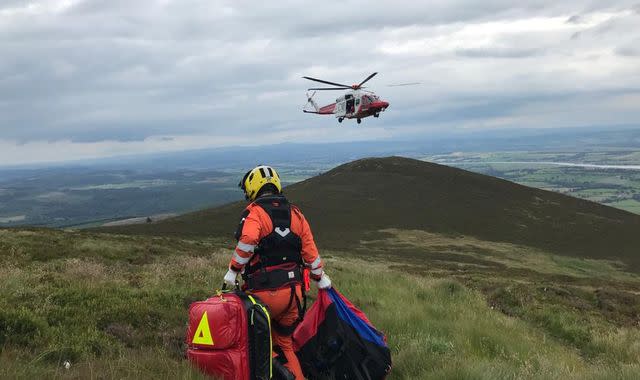Volunteers could quit rescue teams over cost of living pressures - as figures show increase in callouts for search helicopters

The UK's cost of living crisis could soon have an impact on the work of volunteer mountain rescue teams, bosses have warned.
Mike Margeson OBE, Operations Director at Mountain Rescue England and Wales, says a squeeze on income, including the cost of fuel to get to rescue bases, could lead volunteers to pull back or leave teams entirely.
He says some bases are even considering paying fuel expenses to volunteers to help cover their increased costs.
But search and rescue charities are themselves facing their own cost pressures, including higher fuel and heating bills, he warns.
They are also facing a potential decrease in donations, as people around the UK look to reduce their own outgoings.
He told Sky News: "Everyone is a volunteer… but even the smallest team can cost up to £50,000-a-year to run and the larger ones up to £100,000.
"Everything has gone up in cost, like fuel and the cost of equipment, and particularly insurance.
"Volunteers also have to pay more for fuel to get into the base.
"You've also got employers who are under pressure who might be more reluctant to let staff go off to the rescues and that can be difficult as well."
Mr Margeson said he was concerned that volunteers could cut back or leave the service altogether.
"We are considering helping with fuel costs to take some of the pressure off," he added.
Number of search and rescue helicopter callouts increases
It comes as figures from the Office for National Statistics show an increase in the number of callouts for search and rescue helicopters this year.
The helicopters, which are run and staffed by private company Bristow on behalf of HM Coastguard, are used in rescue operations overland, by the coast and at sea.
They can be called in to assist in mountain rescue operations on the advice of volunteer mountain rescue teams.
Figures show there were 2,141 taskings in total between January and September this year, with the largest majority (47%) being land-based.
Over the same period last year there were 2,064 calls, while there were 1,858 between January and September in 2019 - prior to the COVID pandemic.
More than half of the taskings (1,116) this year have been rescue operations, with 504 being support roles, 298 being search-only missions and 223 being pre-arranged transfers.
In total, 1,186 people have been rescued by the helicopters so far this year.
Figures show Prestwick, covering western Scotland, the Hebrides and parts of the Lake District, has been the busiest base this year, with 329 taskings.
Inverness, covering the Scottish Highlands, with 279, and Caernarfon, covering northern Wales including Mount Snowdon, with 277, have been the second and third busiest bases this year.
Increase in people taking part in outdoor activities is 'a positive'
Mr Margeson says his own service has seen a steady increase in callouts over the last decade.
He said that this is partly due to the increase in popularity of new outdoor activities, as well as more people discovering hiking and adventuring during the pandemic.
Mr Margeson said it is positive that more people are trying outdoor activities.
"The main thing is that people stay safe," he said.
"There has never been so much information about, but it's just about getting it to the right people."
Commenting on the figures, a spokesperson for the Maritime and Coastguard Agency said: "We always have and always will respond to anyone in distress.
Subscribe for free to the Daily podcast on Apple Podcasts, Google Podcasts, Spotify, Spreaker
"Over a thousand people have reason to be thankful for His Majesty's Coastguard's helicopter service.
"It's evident from these stats that HM Coastguard helicopters have responded to even more 999 and other emergency calls than they did pre-pandemic.
"We're immensely proud of our search and rescue helicopter service and - more importantly - the crews that fly them, the engineers who maintain them and the support staff who all work around the clock to save lives."

 Yahoo News
Yahoo News 
